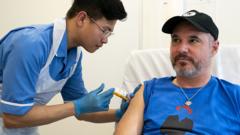59 minutes ago
About sharing
An important trial of the world’s first “personalised” mRNA vaccine against the deadliest form of skin cancer – melanoma – is now under way in the UK.
Steve Young, 52, from Stevenage, Herts, who had a melanoma growth cut out of his scalp last August, is one of the first patients to try the shot.
It is designed to help his immune system recognise and wipe out any remaining cancerous cells.
And hopefully, that means his cancer will not return.
The jab, mRNA-4157 (V940), uses the same technology as current Covid vaccines and is being tested in final-stage Phase III trials.
University College London Hospitals (UCLH) doctors are giving it alongside another drug, pembrolizumab or Keytruda, that also helps the immune system kill cancer cells.
Genetic signature
The combined treatment, made by Moderna and Merck Sharp and Dohme (MSD), is not yet available routinely on the NHS, outside of clinical trials.
Experts in some other countries, including Australia, are also trying it on patients, to gather more evidence and see whether it should be rolled out more widely.
The vaccine is personalised – meaning the make-up of it is changed to suit the individual patient.
It is created to match the unique genetic signature of the patient’s own tumour and works by instructing the body to make proteins or antibodies that attack markers or antigens found only on those cancer cells.
‘Custom built’
UCLH investigator Dr Heather Shaw said the jab had the potential to cure people with melanoma and was being tested in other cancers – lung, bladder and kidney tumours.
“This is one of the most exciting things we’ve seen in a really long time,” she said.
“It is absolutely custom built for the patient – you couldn’t give this to the next patient in the line because you wouldn’t expect it to work.
“It’s truly personalised.
“These things are hugely technical and finely generated for the patient.”
‘Really excited’
The UK part of the international trial aims to recruit at least 60-70 patients across eight centres, including in London, Manchester, Edinburgh and Leeds.
Mr Young is having his treatment in London.
He said: “I’m really, really excited.
“This is my best chance at stopping the cancer in its tracks.”
Common signs of melanoma include:
a new abnormal mole
an existing mole that seems to be growing or changing
a change to a previous patch of normal skin
Mr Young had a lump on his scalp for many years before realising the growth was cancer.
The earlier a melanoma is picked up, the easier it is to treat and the more likely treatment is to be successful.
22 January
27 March
